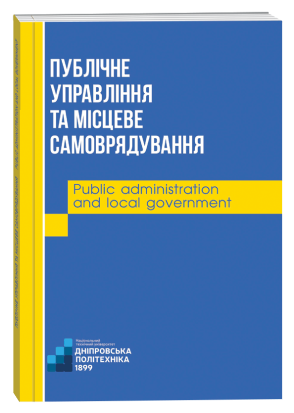CRISIS SITUATIONS AND THEIR IMPACT ON SEPARATION OF POWERS: A COMPARATIVE STUDY OF FRANCE, GERMANY, AND UKRAINE
DOI:
https://doi.org/10.32782/2414-4436/2023-3-7Keywords:
Separation of Powers, Crisis Management, Democratic Governance, Balance of Powers, Democratic Values, Institutional Resilience, Democratic Resilience, Erosion of Separation of PowersAbstract
In the realm of political upheavals, emergencies, and security threats, crisis situations present an intricate challenge to the delicate equilibrium of power within democratic systems. This study delves into the nuanced ramifications of such crises on the democratic distribution of power, meticulously scrutinizing the measures implemented to safeguard and preserve democratic values. Focusing on a comprehensive comparative examination of France, Germany, and Ukraine, the article seeks to unravel the intricacies of crisis management while upholding the crucial principle of the separation of powers. The comparative analysis embarked upon in this study is designed to illuminate the diverse responses exhibited by different countries in the face of crises. These responses are not only contingent on the unique political landscapes of these nations but are also intricately interwoven with their distinct legal structures and historical trajectories. The multifaceted nature of crisis impact on democratic norms necessitates a nuanced understanding of the varied approaches adopted by nations in their efforts to maintain the delicate balance of power during tumultuous times. Preserving democratic values in the tumult of a crisis demands a meticulous calibration, where swift responses are harmonized with an unwavering commitment to democratic norms. Furthermore, the enduring consequences of the erosion of the separation of powers resonate across the tapestry of contemporary governance. This erosion leaves an indelible imprint on executive authority, accountability mechanisms, policy formulation, institutional stability, and public trust. This study underscores the imperative of addressing powersharing dynamics during crisis situations, underscoring that the erosion of democratic principles has the potential to undermine the very foundations of democratic governance. The intricate interplay between crises and governance warrants careful examination, offering valuable insights into the adaptive capacity of democratic systems in the face of evolving global dynamics. Invoking contemplation on the concept of democratic resilience, the research aspires to contribute to the ongoing discourse on the preservation of democratic values. In a world marked by perpetual change and uncertainty, understanding the intricate relationship between crises and governance becomes paramount. This study endeavors to enrich this discourse by unraveling the complex dynamics at play and shedding light on how democratic systems navigate the challenges posed by crises while upholding their fundamental values.
References
Blumenau, B. (2018). “Executive Decrees in Times of Crisis: A Comparative Analysis”. The Journal of Politics, 80(2), 476–491.
Waldron, J. (2018). "The Core of the Case against Judicial Review." Yale Law Journal, 127(7), 2460–2500.
Dyzenhaus, D. (2019). "The Politics of Crisis." Ratio Juris, 32(1), 1–17.
Posner, E. A. (2014). "The Demands of Dignity: A Response to Jeremy Waldron." Yale Law Journal, 123(3), 704–724.
Banaszak, L. (2018). "Women's Movements in Transition and Authoritarian Regimes." Comparative Political Studies, 51(14), 1921–1952.
Gallagher, M. E., & Nardulli, P. F. (2018). "Using Time Series Cross-Section Data: Current Challenges and Research Strategies." Research Methods in the Study of Political Science, 123–144.
Grzymała-Busse, A. (2015). "Why Comparative Politics Needs the State." Annual Review of Political Science, 18, 395–421.
Alter, Karen J. (2015). The New Terrain of International Law: Courts, Politics, Rights. Princeton University Press.
Meunier, Sophie, & Kalypso Nicolaidis. (2017). "The European Union as a conflicted trade power." Journal of European Public Policy 24(9), 1279–1298.
Gabel, D., & Hug, S. (2019). Executive Emergency Powers: Balancing the Conflict of Interest between the President and the Bundestag. German Politics, 28(4), 556–575.
Neubert, M. J. (2016). Protecting the German Constitution from Inside and Out: The "Schmidt Norm" and Its Aftermath. In The Political Power of the Bundesverfassungsgericht (pp. 217–244). Springer.
Rasmussen, M. (2014). Germany and the Euro Crisis: A European Power Project?, European Journal of International Relations 20, № 1: 61–86.
Schwartz, S. & Dubovyk, Vladimir. (2018). "Ukraine's presidential election: Populism in the spotlight." East-West: Journal of Ukrainian Studies 5(2), 79–104.
Shlapak, Oleksandr. (2019). "The Politics of Constitutional Change in Post-Euromaidan Ukraine: Fostering Rule of Law or Power Grab?" East European Politics and Societies 33(4), 952–975.
Luhovy, Yaroslav. (2020). "Quasi-Presidential or Semi-Parliamentary: Ukrainian Constitutional Designs in Comparative Perspective." Politics in Central Europe 16(1), 89–110.






